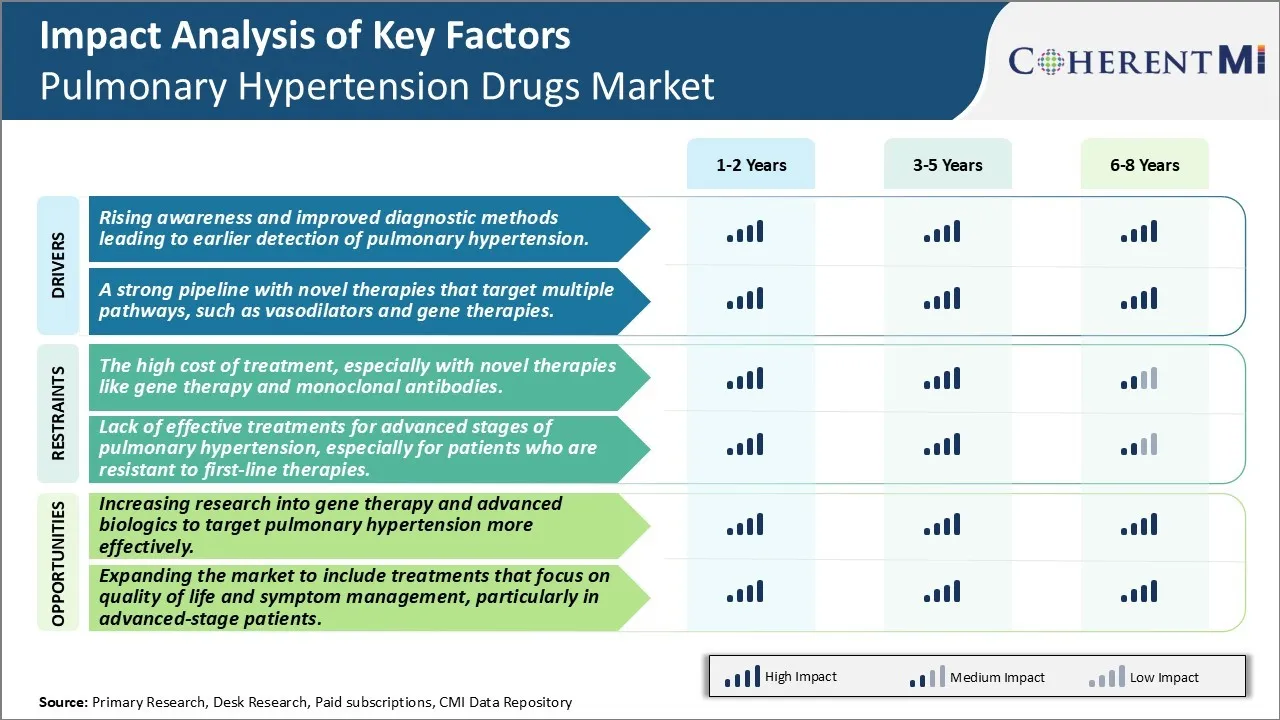Pulmonary Hypertension Drugs Market Trends
Market Driver - Rising Awareness and Improved Diagnostic Methods Leading to Earlier Detection of Pulmonary Hypertension.
With increased awareness about symptoms and risk factors associated with pulmonary hypertension, a high number of people are getting themselves screened regularly. Pulmonary hypertension is usually difficult to diagnose at an early stage as symptoms are vague and non-specific. However, recent diagnostic advancements such as right heart catheterization and echocardiography have enabled accurate detection and classification of disease even at mild or moderate stages. This has significantly improved survival rates as patients can now seek treatment much before the condition progresses to later stages. Numerous non-profit organizations and advocacy groups are also educating general public and healthcare providers through various awareness programs. They educate people on recognising early warning signs of the disease and emphasise importance of timely medical advice. All these efforts have collectively contributed towards identifying more PH patients and allowing them to access life-prolonging therapies in a timely manner. As a result of early detection, the target population suitable for currently available treatment options has expanded. This acts as a major growth driver for pharmaceutical companies manufacturing approved drugs for pulmonary hypertension.
Market Driver - A Strong Pipeline with Novel Therapies That Target Multiple Pathways, Such as Vasodilators and Gene Therapies.
The pulmonary hypertension treatment landscape is evolving at a rapid pace with many novel molecules in different stages of clinical trials. Major focus is on developing oral therapies that work through novel mechanisms of action and pathways. Several drug candidates are under investigation that act as vasodilators by directly targeting pathways involved in smooth muscle cell proliferation and pulmonary artery constriction. Gene and cell-based therapies are also being researched which can potentially provide long term benefit by correcting the underlying genetic deficiencies seen in certain types of PH. A few therapies are exploring angiogenesis and mobilization of stem cells for repairing damaged pulmonary vasculature. A wave of pipeline drugs gaining approvals in the coming years will generate many fresh treatment options with improved safety profiles. This robust pipeline helps sustain the enthusiasm of medical community as well as patients. Availability of promising investigational therapies keeps stakeholders hopeful about finding more effective long term solutions that could slow disease progression and improve outcomes. Such a vibrant clinical development activity augurs well for the overall pulmonary hypertension market.

Market Challenge - The High Cost of Treatment, Especially with Novel Therapies Like Gene Therapy and Monoclonal Antibodies.
The high cost of treatment, especially with novel therapies like gene therapy and monoclonal antibodies poses a major challenge for the pulmonary hypertension drugs market. Developing new drugs and therapies using cutting edge technologies like gene therapy require massive investments in research and clinical trials over many years. This adds significantly to the overall cost of successful new drug launches. Moreover, since pulmonary hypertension is a rare disease with a relatively small patient pool worldwide, the development costs cannot be recouped quickly. As a result, novel drugs for pulmonary hypertension often enter the market with annual price tags of over USD100,000 per patient. The financial burden of such expensive therapies makes them inaccessible to many patients. Insurance companies and governments find it difficult to provide coverage and reimbursement for high-cost drugs. This economic hurdle reduces the uptake of innovative new treatments and hence limits the market potential and growth opportunities for drug makers.
Market Opportunity: Increasing Research into Gene Therapy and Advanced Biologics.
Increasing research into gene therapy and advanced biologics to target pulmonary hypertension more effectively offers promising opportunities for market growth. Scientists are exploring novel gene therapy approaches that could potentially cure pulmonary hypertension by correcting the underlying genetic defects. Several biotechs and pharmaceutical companies are actively conducting clinical trials of gene therapies delivered via viral vectors. At the same time, monoclonal antibodies and other biologic drugs are being developed that can better regulate pathways involved in pulmonary artery constriction and remodelling. If successful, such advanced modalities could revolutionise treatment by achieving superior efficacy than existing drugs with durability of response. Their ability to deliver long-lasting benefits in a single course of treatment also addresses the compliance challenges with daily oral regimens. As research progresses, newer biologics and gene therapies are expected to enter the market in the coming years, driving higher spending and expanding the pulmonary hypertension drugs market size significantly.